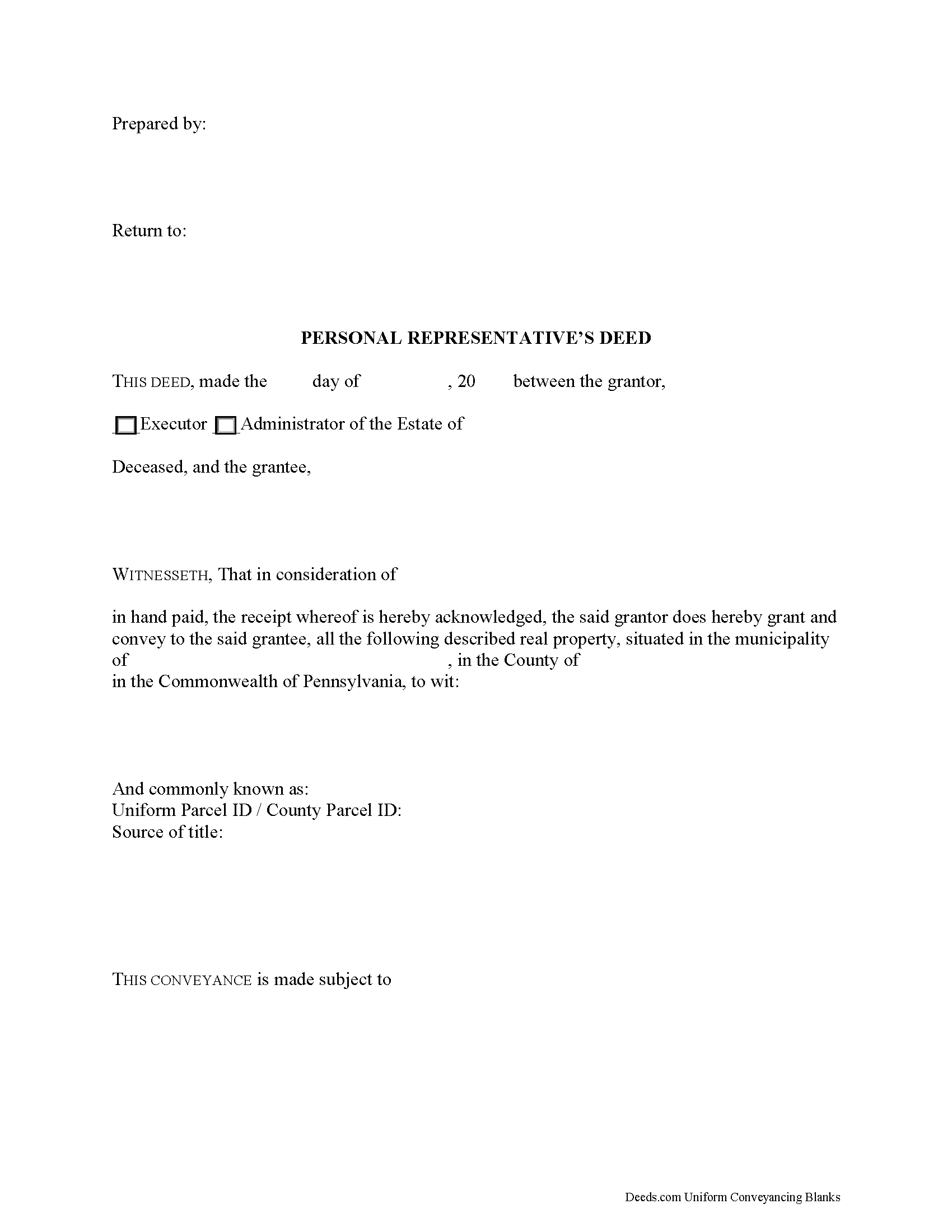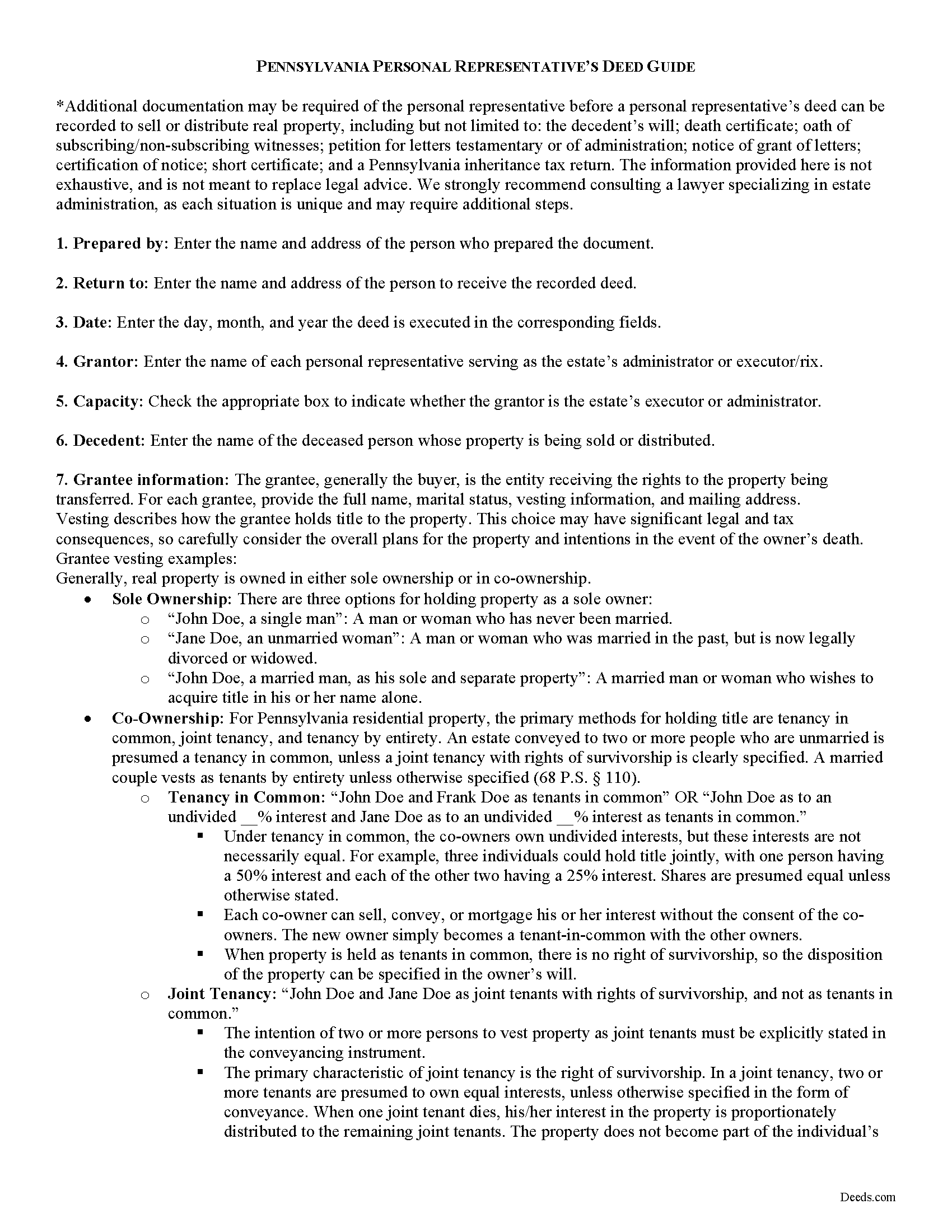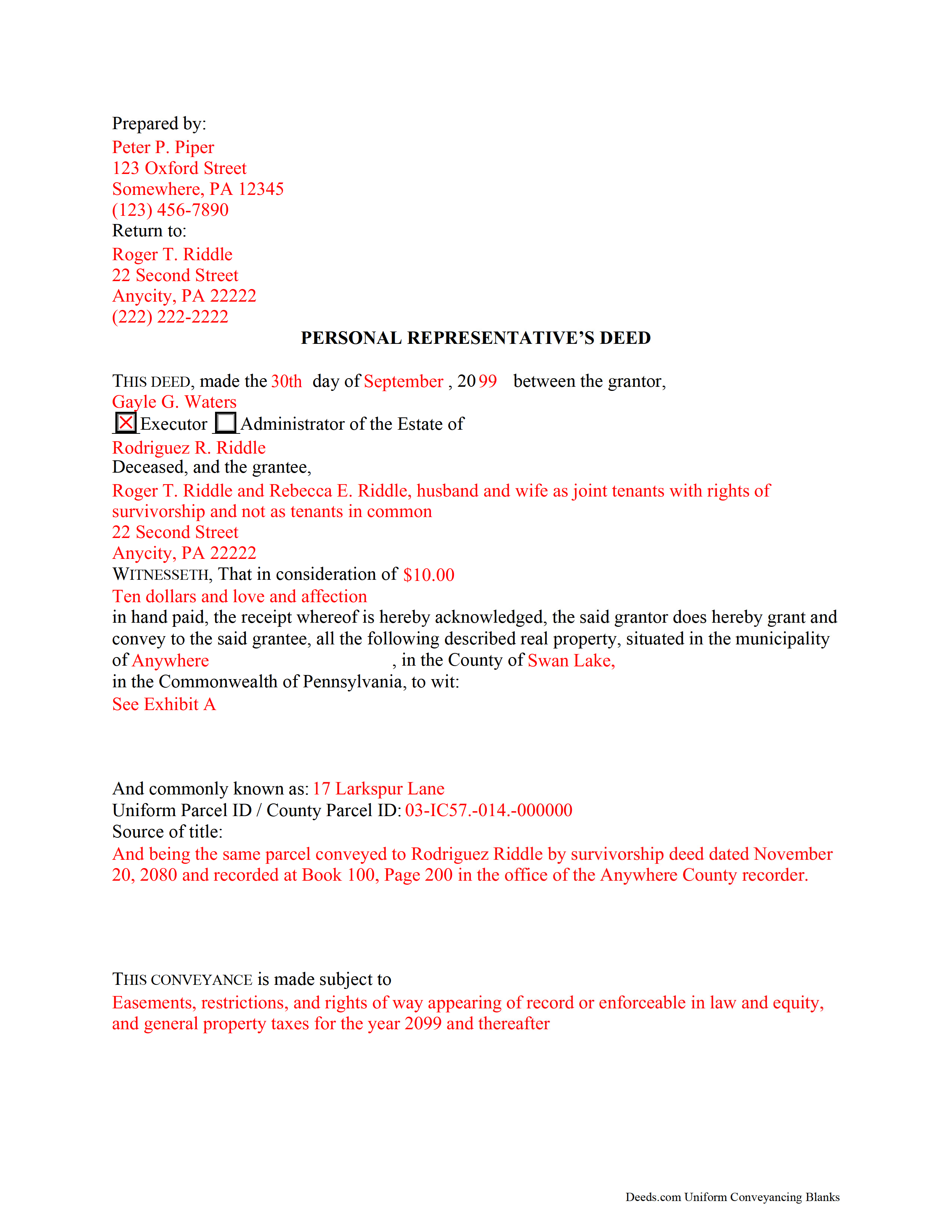Pike County Personal Representative Deed Form (Pennsylvania)
All Pike County specific forms and documents listed below are included in your immediate download package:
Personal Representative Deed Form

Fill in the blank form formatted to comply with all recording and content requirements.
Included Pike County compliant document last validated/updated 7/7/2025
Personal Representative Deed Guide

Line by line guide explaining every blank on the form.
Included Pike County compliant document last validated/updated 5/26/2025
Completed Example of the Personal Representative Deed Document

Example of a properly completed form for reference.
Included Pike County compliant document last validated/updated 5/29/2025
The following Pennsylvania and Pike County supplemental forms are included as a courtesy with your order:
When using these Personal Representative Deed forms, the subject real estate must be physically located in Pike County. The executed documents should then be recorded in the following office:
Pike County Recorder of Deeds
506 Broad St, Milford, Pennsylvania 18337
Hours: 8:30 a.m. - 4:30 p.m. Monday - Friday
Phone: (570) 296-3508
Local jurisdictions located in Pike County include:
- Bushkill
- Dingmans Ferry
- Greeley
- Greentown
- Hawley
- Lackawaxen
- Matamoras
- Milford
- Millrift
- Paupack
- Rowland
- Shohola
- Tafton
- Tamiment
- Unity House
How long does it take to get my forms?
Forms are available immediately after submitting payment.
How do I get my forms, are they emailed?
Immediately after you submit payment, the Pike County forms you order will be available for download directly from your account. You can then download the forms to your computer. If you do not already have an account, one will be created for you as part of the order process, and your login details will be provided to you. If you encounter any issues accessing your forms, please reach out to our support team for assistance. Forms are NOT emailed to you.
What does "validated/updated" mean?
This indicates the most recent date when at least one of the following occurred:
- Updated: The document was updated or changed to remain compliant.
- Validated: The document was examined by an attorney or staff, or it was successfully recorded in Pike County using our eRecording service.
Are these forms guaranteed to be recordable in Pike County?
Yes. Our form blanks are guaranteed to meet or exceed all formatting requirements set forth by Pike County including margin requirements, content requirements, font and font size requirements.
Can the Personal Representative Deed forms be re-used?
Yes. You can re-use the forms for your personal use. For example, if you have more than one property in Pike County that you need to transfer you would only need to order our forms once for all of your properties in Pike County.
What are supplemental forms?
Often when a deed is recorded, additional documents are required by Pennsylvania or Pike County. These could be tax related, informational, or even as simple as a coversheet. Supplemental forms are provided for free with your order where available.
What type of files are the forms?
All of our Pike County Personal Representative Deed forms are PDFs. You will need to have or get Adobe Reader to use our forms. Adobe Reader is free software that most computers already have installed.
Do I need any special software to use these forms?
You will need to have Adobe Reader installed on your computer to use our forms. Adobe Reader is free software that most computers already have installed.
Do I have to enter all of my property information online?
No. The blank forms are downloaded to your computer and you fill them out there, at your convenience.
Can I save the completed form, email it to someone?
Yes, you can save your deed form at any point with your information in it. The forms can also be emailed, blank or complete, as attachments.
Are there any recurring fees involved?
No. Nothing to cancel, no memberships, no recurring fees.
Using a Personal Representative's Deed in Pennsylvania
--
The information provided in this article is not meant to be exhaustive, and should not take the place of legal advice. We strongly recommend consulting a lawyer when administering an estate, as each situation is unique. Personal representatives have a fiduciary duty to serve in the estate's best interests, and are "personally liable for undue mistakes made in the administration of the decedent's estate" [1].
--
When Pennsylvania residents die, their estate is admitted to probate, regardless of whether they left a will. A will is a legal document whereby a person (testator) gives directions for the distribution of personal assets upon death, and identifies who will administer the estate. Probate is the legal process of distributing assets. In the Commonwealth of Pennsylvania, this process, also referred to as estate administration, is governed by Title 20 et seq. of the Pennsylvania Code (Decedents, Estates, and Fiduciaries).
A probate case begins with the Register of Wills for the county where the deceased claimed permanent residence. Those with property situated in two or more counties also require ancillary probate proceedings. The decedent's will, if one exists, is recorded at this time, along with supporting documents (ex. death certificate, affidavit of subscribing or non-subscribing witness, petition for grant of letters). Pennsylvania implements an expedited probate for estates valued under $50,000.
Upon petition for grant of letters, the Register of Wills issues letters of administration or letters testamentary, depending on whether the decedent died testate (with a will) or intestate (without a will). The letters are a document granting formal authority to the fiduciary who will administer the estate, and are filed as part of the probate case. Fiduciaries may also obtain a short certificate from the Register certifying their capacity to administer the decedent's estate.
This fiduciary is known generally as a "personal representative," or more specifically as either an executor (or executrix, if female) or an administrator. The term "executor" is used when the decedent died with a will and named an executor. The term "administrator" is used when (1) the decedent died without a will (2) the decedent died testate but failed to name an executor in the will, or (3) the decedent died with a will and named an executor, but the executor failed or ceased service. In short, an executor is someone designated by will as the personal representative, whereas an administrator is someone appointed by the Register.
All assets owned solely by the decedent must go through probate. Concerning real property, when the decedent vests title as a sole owner or as a tenant in common, the real property will need to go through probate before it can be distributed by the personal representative. Real property vested with rights of survivorship between or among joint tenants or between husband and wife as tenants by the entirety automatically vests in the surviving joint tenant(s) or spouse. Property held in trust may also avoid probate.
The personal representative has several responsibilities as fiduciary, including submitting a comprehensive inventory of the estate, filing a Pennsylvania Inheritance Tax Return, giving notice to beneficiaries, and paying any debts, before any distribution of assets can occur. Depending on the situation, this process may take several months, so seek legal advice to ensure that all requisite steps are met.
When the decedent leaves instructions for the succession of real property, the named beneficiaries in the will are called devisees. When there is no will, Pennsylvania laws of intestacy determine the succession of the decedent's real property, with title flowing to the decedent's heirs at law. Depending on the situation, the personal representative may sell the decedent's real property [2].
In Pennsylvania, both executors and administrators use the personal representative's deed to distribute or sell real property. As with other types of deeds executed by grantors in a representative capacity (such as trustee's deeds), the personal representative's deed in Pennsylvania typically carries a special warranty, covenanting that the grantor will warrant and defend the property against the lawful claims and demands of the grantor or grantors, and all persons claiming or to claim by, through, or under him or them (21 P.S. 6). The special warranty is fitting for grantors who are transferring property indirectly, or on behalf of, an estate, as they may not have comprehensive knowledge of the title's history prior to the decedent's death.
The deed identifies the acting personal representative as either an executor or administrator, as well as the decedent and date of death. In addition to the grantee and vesting information, legal description of the subject property, and title derivation required for documents pertaining to interests in real property, the personal representative's deed cites the date of the testator's will, if any; the date of probate; the county of probate; the file or case number; and the name of the personal representative.
The deed is signed by the acting representative in the presence of a notary public and recorded in the county Register of Deeds in which the subject real property is situated. Additional notices may be required in Pennsylvania concerning coal and mine subsidence, and supporting documents such as a death certificate and a short certificate may be required to verify the personal representative's authority to convey real property.
To formally close probate, the personal representative must file a report of completion with the register of wills.
If administration of estate not complete within two years of the decedent's date of death, the personal representative may have to file a status report with Register of Wills.
See more forms relating to estate administration at http://www.revenue.pa.gov/FormsandPublications/FormsforIndividuals/Pages/Inheritance-Tax.aspx#.WFABK-YrLIU.
Contact a lawyer with questions regarding estate administration and probate in Pennsylvania.
[1] http://www.whiteandwilliams.com/resources-alerts-Personal-Representatives-and-Fiduciaries-Executors-Administrators-and-Trustees-and-Their-Duties.html
[2] http://www.stallardlawoffice.com/single-post/2015/09/19/Posts-on-Pennsylvania-Real-Property-Title-Death-Wills-and-Joint-Ownership
(Pennsylvania PRD Package includes form, guidelines, and completed example)
Our Promise
The documents you receive here will meet, or exceed, the Pike County recording requirements for formatting. If there's an issue caused by our formatting, we'll make it right and refund your payment.
Save Time and Money
Get your Pike County Personal Representative Deed form done right the first time with Deeds.com Uniform Conveyancing Blanks. At Deeds.com, we understand that your time and money are valuable resources, and we don't want you to face a penalty fee or rejection imposed by a county recorder for submitting nonstandard documents. We constantly review and update our forms to meet rapidly changing state and county recording requirements for roughly 3,500 counties and local jurisdictions.
4.8 out of 5 - ( 4564 Reviews )
Michael G.
July 14th, 2025
Very helpful and easy to use
Your appreciative words mean the world to us. Thank you.
JAMES D.
July 10th, 2025
Slick as can be and so convenient.rnrnWorked like a charm
Thank you for your feedback. We really appreciate it. Have a great day!
MARY LACEY M.
June 30th, 2025
Great service! Recording was smooth and swiftly performed. Deeds.com is an excellent service.rn
We are delighted to have been of service. Thank you for the positive review!
Glenda C.
February 21st, 2021
It was easy to find what I was looking for.
The instructions were easy to follow.
The example given was most beneficial in completing form.
We appreciate your business and value your feedback. Thank you. Have a wonderful day!
A. S.
February 27th, 2019
First, I am glad that you gave a blank copy, an example copy, and a 'guide'. It made it much easier to do. Overall I was very happy with your products and organization... however, things got pretty confusing and I have a pretty 'serious' law background in Real Estate and Civil law. With that said, I spent about 10+ hours getting my work done, using the Deed of Trust and Promissory note from you and there were a few problems: First, it would be FANTASTIC if you actually aligned your guide to actually match the Deed or Promissory Note. What I mean is that if the Deed says 'section (E)' then your guide shouldn't be 'randomly' numbered as 1,2,3, for advice/instructions, but should EXACTLY match 'section (E)'. Some places you have to 'hunt' for what you are looking for, and if you did it based on my suggestion, you wouldn't need to 'hunt' and it would avoid confusion. 2nd: This one really 'hurt'... you had something called the 'Deed of Trust Master Form' yet you had basically no information on what it was or how to use it. The only information you had was a small section at the top of the 'Short Form Deed of Trust Guide'. Holy Cow, was that 'section' super confusing. I still don't know if I did it correctly, but your guide says only put a return address on it and leave the rest of the 16 or so page Deed of Trust beneath it blank... and then include your 'Deed of Trust' (I had to assume the short form deed that I had just created) as part of it. I had to assume that I had to print off the entire 17 page or so title page and blank deed. I also had to assume that the promissory note was supposed to be EXHIBIT A or B on the Short Form Deed. It would be great if someone would take a serious look at that short section in your 'Short Form Deed of Trust Guide' and realize that those of us using your products are seriously turning this into a county clerk to file and that most of us, probably already have a property that has an existing Deed... or at least can find one in the county records if necessary... and make sure that you make a distinction between the Deed for the property that already exists, versus the Deed of Trust and Promissory note that we are trying to file. Thanks.
Thank you for your feedback. We'll have staff review the document for clarity. Have a great day!
Carole M.
June 9th, 2020
So far it seems easy and hopefully be acceptable to Hillsborough Co
We appreciate your business and value your feedback. Thank you. Have a wonderful day!
Cathleen H.
January 25th, 2019
The pdf form is good; however, the input boxes merge into the line above so the text is hard to read when complete. I added a return before entering my data and this solved the problem.
Thank you for your feedback Cathleen. We will have staff take a look at the document for issues with the text fields. Have a great day!
FEDERICO T.
June 21st, 2019
It was a little confusing to retrieve the documents. I was waiting for an email, but then I went toyour portal and I saw the messages and the document.
Thank you for your feedback Frederico.
RAUL G.
October 14th, 2019
Very pleased with the service, easy to download and print
Thank you for your feedback. We really appreciate it. Have a great day!
Kim C.
October 5th, 2020
Very user-friendly and easy to obtain exactly what I needed. I am impressed by the sample forms as well. I will definitely be using Deeds.com again!!
Thank you for your feedback. We really appreciate it. Have a great day!
Carol S.
May 7th, 2022
Needed a Quit Claim Deed and am so happy I went to Deeds.com. Completed my forms - they looked professional and had no problem submitting them to Assessor's office. PERFECT!
We appreciate your business and value your feedback. Thank you. Have a wonderful day!
Anna L W.
December 19th, 2021
Was insecure about being able to access the information but pleasantly found that the site was easy to use. Seems that I can use it repeatedly to go back and reprint the forms once I paid.
We appreciate your business and value your feedback. Thank you. Have a wonderful day!
Jason J.
May 20th, 2025
My first submission was super quick and easy. I had trouble with the second submission, as I was not aware of what the county would require, but the team at Deeds.com walked me through every step of the process. Will definitely use again and refer business partners to Deeds.com!
Thank you, Jason! We’re glad your first submission went smoothly and appreciate your patience with the second. County requirements can vary, and we’re always here to help make the process as simple as possible. We look forward to assisting you — and your business partners — again soon!
Donald T.
February 6th, 2020
very user friendly. includes an example you can reference, and explanation of terms, which helps greatly in understanding.
Thank you!
Anthony L.
February 15th, 2020
I recently needed an affidavit of death. The form and help tools made it easy to fill out and file. the Recorder accepted this form . Which made the experience painless and easy . All things considered..
We appreciate your business and value your feedback. Thank you. Have a wonderful day!